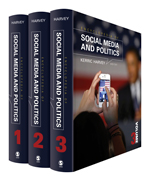Encyclopedia of Social Media and Politics
 The Encyclopedia of Social Media and Politics is a three volume work from Sage that explores the rise of social media effects on politics in the United States and around the world.
The Encyclopedia of Social Media and Politics is a three volume work from Sage that explores the rise of social media effects on politics in the United States and around the world. Edited by Kerric Harvey of George Washington University, the work carries over 600 essays that fall in general topic areas: Celebrities and Pioneers in Social Media; Congressional Social Media Usage, Measuring Social Media's Impact; Misuse of Social Media in the Political Arena; Social Media, Candidates and Campaigns; Social Media, Politics and Culture; Social Media and Networking Web Sites; Social Media and Political Unrest, Social Media and Social Activism; Social Media Concepts and Theories; Social Media Regulation, Public Policy and Actual Practice; and Social Media Types, Innovation and Technology.
Volume III includes not only a good resource guide of related books, journals and websites but a detailed appendix tracking social media usage by U.S. Senators and Congressmen--what platforms they use, and the number and frequency of their posts.
These volumes are a good place for beginners and more seasoned researchers to start their investigation of this rapidly transforming area of two interlocking fields, communication and political science. Available in the Reference section of the Annenberg Library.
Labels: Facebook, political communication, social media, Twitter, You Tube

